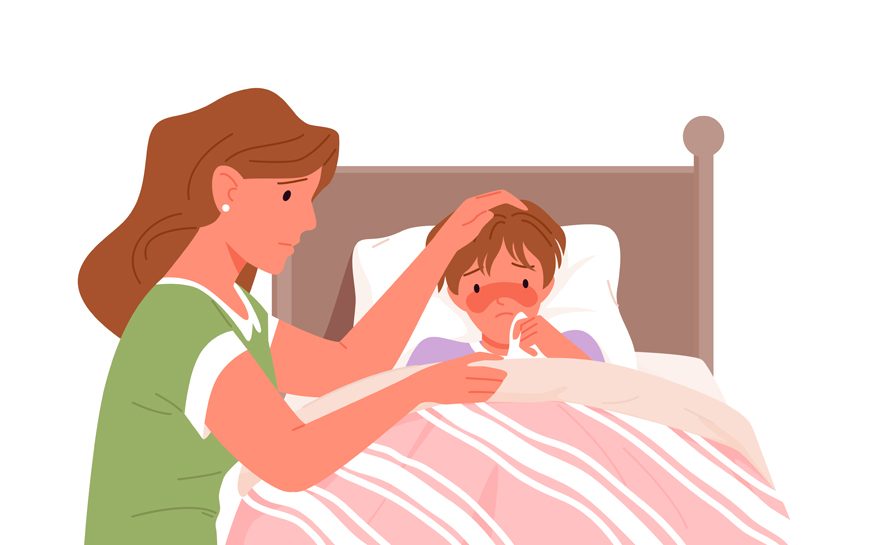Witnessing your child endure a fever can be a distressing experience for any parent. Nevertheless, it’s crucial to comprehend that a fever is not an ailment on its own but rather an indicator of an underlying issue, frequently an infection. In children, a fever is typically identified when their body temperature elevates to 100.4°F (38°C) or beyond.
Fever in Kids: A Closer Look
Let’s delve further into the realm of fevers in kids. They are an intricate part of the body’s defence mechanism against infections or illnesses. These elevated temperatures signify the immune system operating in full swing, earnestly battling against invading germs or viruses. Although fevers may trigger a sense of worry, they essentially portray your child’s immune system in action, actively striving to preserve their well-being.
Recognizing Fever Symptoms in Kids
Recognizing the signs and symptoms of fever in children is of paramount importance. It empowers parents to take prompt and precise action. Here are some common indicators that should be on your radar:
- Elevated Temperature: The most conspicuous symptom is the rise in body temperature. For precise readings, a dependable digital thermometer should be your tool of choice.
- Chills: Children may feel an overwhelming sensation of cold or experience episodes of shivering when grappling with a fever.
- Irritability: A heightened sense of irritability is common. Your child might be more fussy than usual, owing to the discomfort caused by the fever.
- Flushed Skin: An observation of warm or flushed skin when touched is often a telltale sign.
- Loss of Appetite: A fever can suppress your child’s appetite, and it is not uncommon for them to refuse meals during this period.
- Fatigue: Your child may experience increased fatigue or lethargy. This is entirely normal as their body is directing energy towards combating the infection.
How to Reduce Fever in Kids
The primary goal when your child is grappling with a fever is to alleviate their discomfort while allowing their body to effectively combat the underlying infection. Here are practical steps that can contribute to reducing a fever:
- Hydration is Key: Encourage your child to consume ample fluids such as water, clear broths, or electrolyte solutions. Adequate hydration plays a pivotal role in mitigating the effects of a fever and preventing dehydration.
- Dress Comfortably: Dress your child in lightweight, breathable clothing. This facilitates the dissipation of heat from their body. Avoid the use of heavy blankets or over-layering, which can exacerbate their discomfort.
- Maintain a Comfortable Room Temperature: Strive to establish an environment with a moderate room temperature. Extreme heat or cold might make your youngster feel more uneasy.
- Drugs available over-the-counter include: You could think about giving your child an over-the-counter fever-reducer like acetaminophen (commonly known as Tylenol) or ibuprofen (Advil or Motrin) if their suffering is severe owing to the fever. It is crucial to follow the dose recommendations on the package. It is advised to speak with a pediatrician if you are unsure of the recommended dosage.
- Adequate Rest: Prioritize ensuring that your child receives sufficient rest. Adequate sleep and rest are instrumental in facilitating their recovery process.
How to Treat Fever in Kids
While the management of the fever is pivotal, it is equally crucial to address the root cause. Here’s a comprehensive approach:
- Identify the Underlying Cause: Delve into the probable causes of the fever. It could be triggered by a viral infection, such as a common cold or the flu, a bacterial infection, or other factors like teething or recent immunizations. Understanding the underlying cause can inform your treatment strategy.
- Consult a pediatrician: In scenarios where your child’s fever persists for more than a couple of days or is accompanied by severe symptoms such as breathing difficulties, a stiff neck, a persistent rash, or signs of dehydration, it is imperative to seek consultation with a pediatrician. Their expertise can aid in identifying the precise cause and providing appropriate treatment.
- Regularly Monitor Symptoms: Maintain a vigilant watch over your child’s symptoms. Any deterioration or the emergence of new symptoms should be a signal for you to seek medical advice promptly. Timely intervention can be instrumental in expediting their recovery.
- Isolation, if Necessary: If your child’s illness is contagious, such as the flu, it is advisable to isolate them at home. This not only protects others from illness but also offers your child a relaxing and healing atmosphere.
- Follow Medical Recommendations: Should a healthcare provider prescribe medication? It is imperative to adhere meticulously to their instructions. Continual communication regarding any changes or concerns in your child’s condition is advised for ongoing guidance.
When to Seek Immediate Medical Attention
Although most childhood fevers are manageable at home, specific circumstances necessitate immediate medical attention:
- High Fever: If your child’s temperature escalates to a level surpassing 104°F (40°C), seeking medical assistance without delay is imperative. High fevers can be indicative of a severe infection or other underlying medical conditions that demand prompt attention.
- Seizures: If your child experiences a febrile seizure, swift medical action is imperative. Transport them to the nearest medical facility without delay, or dial 911 for assistance. While febrile seizures can understandably cause distress, it’s essential to remember that they are typically brief and rarely result in lasting harm.
- Breathing Challenges: Should your child face breathing difficulties or exhibit rapid, shallow breaths, it is crucial to seek immediate medical aid. A critical symptom that needs quick assessment and care is respiratory distress.
- Severe Dehydration: Remain vigilant for signs of severe dehydration, which may include a parched mouth, sunken eyes, very dark urine, or extreme fussiness. Dehydration can exacerbate the effects of a fever and requires immediate medical attention.
- Persistent Vomiting: If your child is unable to retain fluids and experiences relentless vomiting, it is advisable to consult a healthcare professional. Persistent vomiting can result in dehydration and electrolyte imbalances.
Conclusion
While fevers in children can understandably trigger concern, they often signify a robust immune response combating an underlying infection. This all-encompassing guide has provided valuable insights on effectively managing fevers in kids, encompassing symptom recognition, fever-reduction methods, and appropriate treatments. It’s important to emphasize that consulting with a healthcare expert is the prudent approach when uncertainties about your child’s condition arise. Your child’s health and happiness are paramount, and with your attentive and well-informed care, they are likely to recuperate swiftly and return to their vibrant and joyful selves.
A reputable name in early childhood education, EuroKids, understands the difficulties parents face when their children are sick with a fever. Any parent who has to deal with a sick child knows how difficult it can be. EuroKids recognizes the necessity of offering parents insightful tips and counsel on how to adequately care for their children under such circumstances. With their dedication to fostering well-rounded child development, EuroKids serves as a valuable resource for parents seeking guidance on what steps to take when their child is dealing with a fever.














